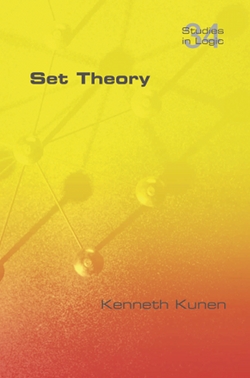 | Set Theory
Kenneth Kunen
This book is designed for readers who know
elementary mathematical logic and axiomatic set
theory, and who want to learn more about set theory.
The primary focus of the book is on the independence
proofs. Most famous among these is the independence
of the Continuum Hypothesis (CH); that is, there are
models of the axioms of set theory (ZFC) in which
CH is true, and other models in which CH is false.
More generally, cardinal exponentiation on the regular
cardinals can consistently be anything not contradicting
the classical theorems of Cantor and König.
The basic methods for the independence proofs are
the notion of constructibility, introduced by Gödel, and
the method of forcing, introduced by Cohen. This book
describes these methods in detail, verifi es the basic
independence results for cardinal exponentiation, and
also applies these methods to prove the independence
of various mathematical questions in measure theory
and general topology.
Before the chapters on forcing, there is a fairly long
chapter on “infi nitary combinatorics”. This consists
of just mathematical theorems (not independence
results), but it stresses the areas of mathematics
where set-theoretic topics (such as cardinal arithmetic)
are relevant.
There is, in fact, an interplay between infi nitary
combinatorics and independence proofs. Infi nitary
combinatorics suggests many set-theoretic questions
that turn out to be independent of ZFC, but it also
provides the basic tools used in forcing arguments. In
particular, Martin’s Axiom, which is one of the topics
under infi nitary combinatorics, introduces many of the basic ingredients of forcing.
2 November 2011
978-1-84890-050-9
|

